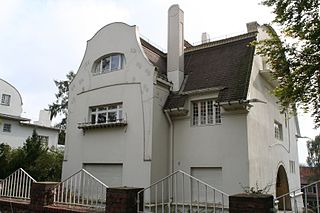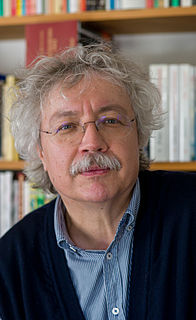
Péter Nádas is a Hungarian writer, playwright, and essayist.

Claudio Magris is an Italian scholar, translator and writer. He was a senator for Friuli-Venezia Giulia from 1994 to 1996.

The Georg Büchner Prize is the most important literary prize for German language literature, along with the Goethe Prize. The award is named after dramatist and writer Georg Büchner, author of Woyzeck and Leonce and Lena. The Georg Büchner Prize is awarded annually for authors "writing in the German language who have notably emerged through their oeuvre as essential contributors to the shaping of contemporary German cultural life".

Christoph Ransmayr is an Austrian writer.

The Deutsche Akademie für Sprache und Dichtung was founded on 28 August 1949, on the 200th birthday of Johann Wolfgang von Goethe, in the Paulskirche in Frankfurt. It is seated in Darmstadt, since 1971 in the Glückert House at the Darmstadt Artists' Colony. It is a society of writers and scholars on matters pertaining to German language and literature in the German sprachraum.

Karl-Markus Gauß is an Austrian contemporary writer, essayist and editor. He lives in Salzburg.

Christoph Hein is a German author and translator. He grew up in the village Bad Düben near Leipzig. Being a clergyman's son and thus not allowed to attend the Erweiterte Oberschule in the GDR, he received secondary education at a gymnasium in the western part of Berlin. After his Abitur he jobbed inter alia as assembler, bookseller and assistant director. From 1967 to 1971 Hein studied philosophy in Leipzig and Berlin. Upon graduation he became dramatic adviser at the Volksbühne in Berlin, where he worked as a resident writer from 1974. Since 1979 Hein has worked as a freelance writer.
Rheingau Literatur Preis is a literary prize of Hesse. It is awarded annually since 1994 by the Rheingau Literatur Festival which follows the Rheingau Musik Festival. An author is awarded whose prose gained the attention of the literary critics
Friedrich-Hölderlin-Preis is a German literary prize. It was established in 1983. In June, the City of Bad Homburg vor der Höhe annually awards the prize. It is endowed with 20,000 euros and is awarded as a general literary award for outstanding achievements. The award commemorates the poet Friedrich Hölderlin who lived in Bad Homburg for a few years. It is awarded at the anniversary of the evening before Friedrich Hölderlin's death.
The Heinrich-Böll-Preis is a literary prize of Germany, awarded by the City of Cologne in memory of Nobel Prize winner Heinrich Böll. The prize money is €30,000. The prize is awarded "for outstanding achievements – even by still unknown authors – in the field of German-language literature".
Joseph-Breitbach-Preis is a literary prize awarded by the Akademie der Wissenschaften und der Literatur Mainz, in Germany and the Joseph Breitbach Foundation. Established in 1998, the prize is worth 50,000 euros and is awarded annually in Koblenz, birthplace of writer Joseph Breitbach (1903–1980), for whom the prize is named.
Kranichsteiner Literaturpreis is a literary prize of Germany. The Deutsche Literaturfonds based in Darmstadt has been awarding the prize since 1983. The prize money was raised in 2019 from €20,000 to €30,000. In addition to the main prize, the Kranichsteiner Literaturförderpreis is also awarded. In 2020 the Deutsche Literaturfonds renamed the prize to Großer Preis des Deutschen Literaturfonds and the prize money has been raised to €50,000. It is awarded for an outstanding literary work, taking into account the current book.

The Ludwig-Börne-Preis is a literary award that is awarded annually by the Frankfurt-based Ludwig-Börne-Stiftung. It is one of the most important of its kind in German-speaking countries.
Rainer-Malkowski-Preis is a literary prize of Germany. The prize is awarded every two years by the Bavarian Academy of Fine Arts in cooperation with the Rainer Malkowski Foundation. The Rainer Malkowski Prize, with prize money of 30,000 euros, is one of the most highly endowed German literary prizes. The prize has been founded in 2005 by the Stiftung zur Förderung deutschsprachiger Literatur, on request of the poet Rainer Malkowski, who died in 2003.
Thomas Mann Prize is a literary prize of Germany. In full the title is "Thomas Mann Prize of the city of Lübeck and the Bavarian Academy of Fine Arts". It is given in alternate years in Lübeck and in Munich. The award is the product of a merger of two prizes in 2010, the Thomas Mann Preis der Hansestadt Lübeck and the Großer Literaturpreis of the Bavarian Academy of Fine Arts. The Thomas Mann Prize Lübeck was first awarded in 1975; the Great Literature Prize was first awarded in 1950. The prize money is €25,000.
The Nicolas Born Prize, awarded by the German state of Lower Saxony, is a literary prize given since 2000 in honour of the writer Nicolas Born. It is awarded to notable German-language writers from Germany, Austria and Switzerland. The main prize is currently 20,000 Euros, and since 2015 a further 10,000 Euro prize has been awarded to a debut author.
The Robert Schumann Prize for Poetry and Music Mainz is a classical music prize named after Robert Schumann, awarded biennially since 2012. The prize money is €15,000, donated by the Strecker Foundation, Mainz. The prize is awarded by the Akademie der Wissenschaften und der Literatur in Mainz, for personalities with an outstanding lifetime achievement in the field of poetry and music.
The Fontane Prize of the City of Neuruppin was donated in 1994 on the occasion of the 175th birthday of Theodor Fontane from his native city of Neuruppin.
The Max Frisch Prize of the City of Zürich, created in 1996, is usually awarded every four years to writers in German-speaking countries. The prize is named after the Swiss writer Max Frisch (1911–1991). The literary award is endowed with a prize sum of 50,000 Swiss francs. In 2018, an additional sponsorship award endowed with 10,000 Swiss francs was introduced in order to be able to support writers of the younger generation as well. The award honors authors whose work addresses fundamental issues of democratic society in an artistically uncompromising manner. The Max Frisch Foundation at ETH Zürich is responsible for judging and determining the winners. The City of Zürich is financing the award and its hosting.







